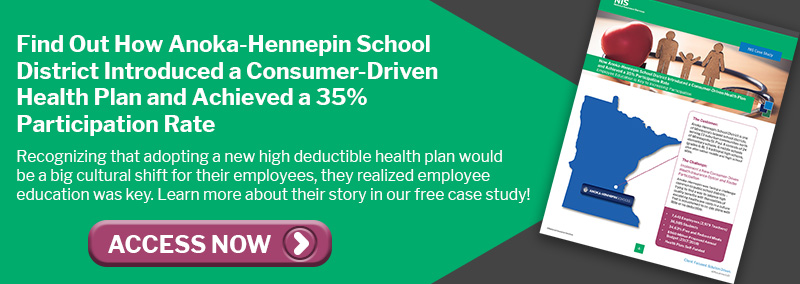Employees with low health insurance literacy frequently utilize more health care services.[1] Often, they do not understand how to choose the appropriate healthcare services and may select an insurance plan that is not right for them. This lack of knowledge not only impacts their lives, it can also impact your bottom line.
What is Health Insurance Literacy?
Health insurance literacy is the “the degree to which individuals have the knowledge, ability, and confidence to find and evaluate information about health plans, select the best plan for their own (or their family’s) financial and health circumstances, and use the plan once enrolled”.[2] According to a 2017 Survey, United Healthcare discovered that only 9% of the US population showed an understanding of all the following basic health insurance terms such as:
- Premium
- Deductible
- Out-of-pocket maximum
- Co-insurance
If your employees are not well-versed in health insurance literacy, they may be less efficient when it comes to utilizing their plans effectively. They may:
- Select an inappropriate plan for their health status
- Stay with the same plan every year even when better options are available
- Not understand how costly an out-of-network physician can be
- Not know how to shop for the best prescription costs
- Delay seeing a doctor when having symptoms
- Skip important preventative care
All these scenarios create higher costs for both themselves and you, their employer.
What Employees Need to Know
It’s important that employees feel confident in their skills and knowledge when it comes to health insurance literacy. According to a report from the Health Insurance Literacy Expert Roundtable, a person with a high level of health insurance literacy would be able to:
- Compare the key features of several health plans; understand the scope of covered services and the cost-sharing provisions associated with broad categories of services;
- Assess the adequacy and fit of the provider network for his or her (or family’s) health and financial circumstances;
- Assess the quality of each plan in terms of measures that are important to him or her, such as processing claims or customer service;
- Understand an Explanation of Benefits (EOB);
- Understand his or her appeal rights; and
- Know where to turn for more information and help.
How Employers Can Help
Fortunately, employers are in a great position to help strengthen their employee’s health insurance literacy. When you provide assistance, it can increase their knowledge and confidence when using their plans correctly.
Consider the following tactics:
- Survey your employees to determine how big or little of a problem you have
- Provide lunch-and-learn sessions discussing topics where their literacy is deficient, such as preventative exams, going to urgent care vs. the emergency room, prescription drug options, shopping around for where to go for an MRI, etc.
- Conduct one-on-one meetings at enrollment time
- Utilize your insurance consultant’s resources and knowledge. Often the agents and carriers have tools they can provide.
- Utilize any and all decision support tools available during open enrollment
- Provide easy access benefit information via apps, videos, online resources, visual guides, flyers, etc.
When you empower your employees to make good decisions, they not only gain confidence in their choices, they can make decisions that will ultimately impact your bottom line by reducing overall expenses and improving their health.
[1] https://nnlm.gov/initiatives/topics/health-literacy
[2] https://consumersunion.org/pub/Health_Insurance_Literacy_Roundtable_rpt.pdf

